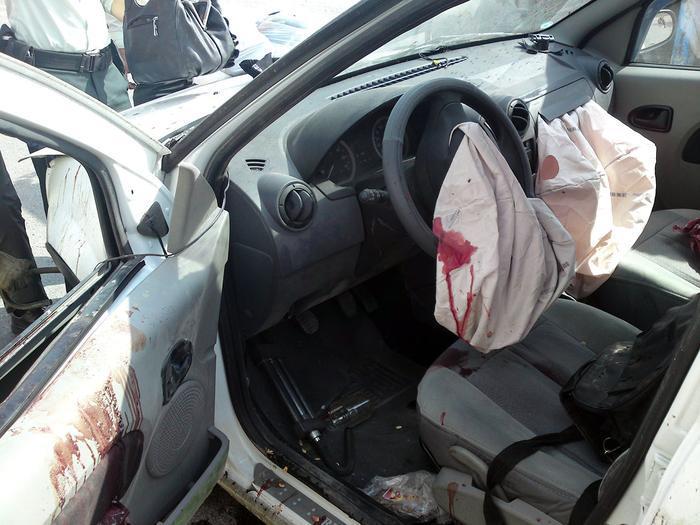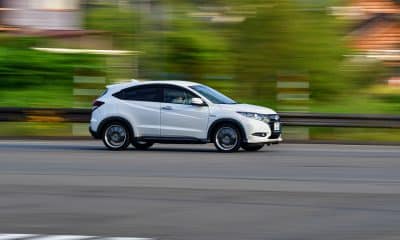Business
US Honda Issues “Do Not Drive” Advisory for 2001 to 2003 Models

Honda and the United States government advise owners of approximately 8,200 older vehicles not to drive them until dangerous air bag inflators are replaced.
The National Highway Traffic Safety Administration issued a “Do Not Drive” advisory on Friday for 2001-2003 vehicles equipped with Takata inflators, which have a high risk of exploding and hurling shrapnel in a crash.
According to the safety agency, the risk to drivers and passengers is severe because the so-called “Alpha” inflators have a 50% chance of exploding in a crash. If the inflators rupture, they can launch shrapnel into the driver’s face, potentially killing or injuring them.
According to the agency, the Honda and Acura vehicles were previously recalled, but records show that repairs were not performed on the affected vehicles. Honda has already replaced 99% of the potentially dangerous inflators.
The 2001 and 2002 Honda Accord and Civic, the 2002 Honda CR-V and Odyssey SUVs, the 2003 Honda Pilot, the 2002 and 2003 Acura 3.2 TL, and the 2003 Acura 3.2 CL are all affected.
Owners can find out if their vehicles are covered by visiting https://www.nhtsa.gov/recalls and entering their 17-digit vehicle identification number.
“These inflators are two decades old and have a 50% chance of rupturing in even a minor crash,” said NHTSA Acting Administrator Ann Carlson. “Don’t risk your life or the life of someone you care about; schedule your free repair today before it’s too late.”
Takata created a small explosion with ammonium nitrate to inflate airbags in a crash. However, the chemical can become more volatile over time when exposed to moisture in the air and repeated high temperatures. The explosion has the potential to rupture a metal canister and launch shrapnel into the passenger compartment.
The exploding airbags have killed at least 33 people worldwide since 2009, including 24 in the United States.
Most of the deaths and approximately 400 injuries occurred in the United States but also in Australia and Malaysia.
Honda has contacted owners over 18 million times via mail notices, emails, phone calls, and even home visits. According to the company, repairs are free, and replacement parts are available. It provides free towing and loaner vehicles as needed.
The possibility of a dangerous malfunction prompted the largest series of auto recalls in US history, with at least 67 million Takata inflators being recalled. According to the US government, millions of homes have not been repaired. Globally, approximately 100 million inflators have been recalled. Takata Corp. of Japan declared bankruptcy due to the exploding airbags.
Honda had by far the most vehicles with Takata inflators.
Honda Airbags in Thailand
Meanwhile, drivers in Thailand are being urged to check the airbags in their vehicles after three people were killed and another seriously injured as a result of Takata Corporation’s faulty airbags.
The problem with Takata airbags, manufactured by the now-defunct Japanese automotive parts company, dates back to 2008 and has resulted in the recall of over 100 million vehicles worldwide.
To date, at least 27 deaths have been linked to faulty airbags.
Takata initially denied a problem with its airbags before admitting that the ammonium nitrate used during manufacturing caused too much pressure, causing the bags to explode.
If the airbag’s inflator ruptures in a crash, metal shards from its housing system can be sprayed throughout the passenger cabin.
Takata was forced to pay over US$850 million in compensation to various car manufacturers and declared bankruptcy in 2017.
Asst. Prof. Dr. Smith Srisont, chief of the forensic laboratory in the Department of Pathology, stated in October that there are currently three cases in Thailand linked to Takata airbag failure, two of which resulted in fatalities and the other in serious and life-changing injuries.
According to Dr. Smith, autopsies on the two deceased confirmed that their deaths were caused by being struck by parts of the airbags. The third case involves metal fragments from an airbag flying into the victim’s jaw and face, causing them to lose sight and hearing in their right ear.
Takata airbags are used in over 1.7 million Thai vehicles from eight manufacturers, including Honda, BMW, Nissan, Toyota, Mitsubishi, Mazda, Chevrolet, and Ford.
Chevrolet (2007-2015), BMW (1998-2018), Ford (1998-2014), Honda (1998-2014), Mazda (2004-2014), Mitsubishi (2005-2015), Nissan (2000-2014), and Toyota are among the vehicles affected (2001-2014).
The Thai Automotive Industry Association recently disclosed that it had recalled vehicles with the problem since 2009. According to a recent survey, over 680,000 Thai cars are still thought to have deadly Takata airbags.
Meanwhile, the Thailand Consumers Council has warned automakers to recall vehicles equipped with airbags.
According to the Thailand Consumers Council, drivers can find out if their vehicle has Takata airbags by visiting www.checkairbag.com or calling the Department of Land Transport’s hotline at 1584.
Drivers can also contact their respective car manufacturer’s call center.
Any replacement airbags are provided at no cost.
Business
Sonic the Hedgehog Dominates Christmas Wish Lists

Sonic the Hedgehog is dominating Christmas wish lists this year. The lovable blue hedgehog is back in the spotlight, from sonic the hedgehog toys and games to sonic the hedgehog coloring pages and movie hype.
Sonic-themed holiday merchandise is on fire, from quirky sweaters to action figures flying off shelves. Sonic the Hedgehog Christmas outfits for kids are selling out fast, making them a go-to gift option for festive fun.
Retailers have been quick to recognize Sonic’s holiday appeal. Special promotions and exclusive items, like the Sonic holiday t-shirts, are everywhere.
Everyone’s stocking up on Sonic merchandise, from big-box stores to boutique retailers.
Online shopping platforms are seeing a surge in searches for Sonic items. Whether it’s Sonic Christmas-themed tops or Sonic the Hedgehog coloring pages, Sonic the Hedgehog toys or Sonic and the Hedgehog 3, the demand is skyrocketing.
Retailers who tap into this trend are sure to see strong holiday sales.
Sonic has been around since the early 90s, but his popularity never wanes. With the release of Sonic 3, fans are more excited than ever.
Sonic the Hedgehog 4
Meanwhile, Paramount Pictures is preparing “Sonic the Hedgehog 4,” with the newest addition in the family-friendly genre set for a spring 2027 release.
The announcement comes as “Sonic 3” opens in theatres on Friday, estimated to gross $55 million to $60 million from 3,800 North American locations.
The sequel is shaping up to be a good holiday season blockbuster for Paramount, which explains the desire in future “Sonic” adventures. On the international front, the film will be released on Christmas Day in 52 markets.
On Rotten Tomatoes, critics gave “Sonic 3” an outstanding 87% fresh score.
The first two films grossed a total of $725.2 million at the global box office and generated over $180 million in global consumer expenditure through home entertainment rentals and digital purchases.
They also inspired a spinoff Paramount+ series, “Knuckles,” which premiered earlier this year.
Related News:
Man Creates Candy Cane Car to Spread Christmas Cheer
Business
Amazon Strike Called By Teamsters Union 10,000 Walkout

An Amazon strike has hit facilities in the United States in an effort by the Teamsters union to pressure the corporation for a labour agreement during a peak shopping season.
The Teamsters union told the Associated Press that Amazon delivery drivers at seven facilities in the United States walked off the job on Thursday after the firm failed to discuss a labour contract.
According to the union, Amazon employees in Teamsters union jackets were protesting at “hundreds” of additional Amazon facilities, which the union billed as the “largest strike” in US history involving the company.
The corporation, which employs over 800,000 people in its US delivery network, stated that its services will be unaffected.
It was unclear how many people, including members of Germany’s United Services Union, participated in Thursday’s demonstration. The Teamsters union reported that thousands of Amazon employees were implicated in the United States.
Amazon Strike at 10 Locations
Overall, the group claims to represent “nearly 10,000” Amazon strikers, having signed up thousands of people at roughly ten locations across the country, many of whom have joined in recent months.
The organization has claimed recognition from Amazon going on strike, claiming the firm illegally neglected its obligation to bargain collectively over salary and working conditions.
The Teamsters is a long-standing US union with nearly one million members. It is well-known for securing lucrative contracts for its members at companies like delivery behemoth UPS.
Most of the Teamsters’ Amazon campaigns have concerned drivers working for third-party delivery companies that partner with the tech behemoth.
Amazon denies that it is liable as an employer in those circumstances, which is a point of legal contention. In at least one case, labour officials have taken a preliminary stance in favour of the union.
Stalled Contract Negotiations
Amazon employees at a major warehouse on Staten Island in New York have also chosen to join the Teamsters. Their warehouse is the only Amazon facility in the United States where labour officials have formally recognized a union win.
However, the Amazon strike is because contract negotiations have not progressed since the 2022 vote. It was not one of the areas scheduled to go on strike on Thursday.
Amazon, one of the largest employers in the United States, has long received criticism for its working conditions and has been the target of activists seeking to gain traction among its employees.
Related News:
Amazon Releases Nova, a Fresh Set of Multimodal AI Models.
Business
Amazon Encounters Numerous Strikes As Unions Aim At The Holiday Shopping Surge.

(VOR News) – Thousands of Amazon employees at various sites across the country were scheduled to go on strike on Thursday in an effort by the Teamsters union to pressure the retail behemoth to acknowledge its unionised workers in the United States.
The walkout is expected to concentrate on seven Amazon locations across the country during the holiday purchasing surge and may be the most significant union action against Amazon in the nation’s history.
The business announced on Thursday morning that there had been no effect on operations. It also stated that it is “continuing to concentrate on fulfilling customers’ holiday orders.”
The International Brotherhood of Teamsters maintains that it represents more than 10,000 Amazon employees and contractors in aviation centres, warehouses, and delivery centres.
Amazon has refused to acknowledge the union for many years.
The retail giant, which employs approximately 1.5 million individuals, excludes contractors and part-timers. A strike has been initiated by delivery couriers and warehouse employees at seven distinct locations in order to exert pressure on the company to negotiate a collective bargaining agreement that would encompass modifications to compensation, amenities, and working conditions.
Picketing was intended for New York, Atlanta, Los Angeles, San Francisco, and Skokie, Illinois.
Also, the Teamsters assert that they are establishing picket lines at “hundreds” of additional warehouses and delivery centres by encouraging non-unionized workers to picket under U.S. labour law, which protects workers’ ability to take collective action to further their interests.
“Amazon workers are exercising their power,” Randy Korgan stated to NPR.
“They now realise there is a pathway to take on a corporate giant like this – and that they hold the power.” Amazon responds by accusing the Teamsters of fabricating information regarding the strikes, asserting that the participants are “entirely” outsiders rather than employees or subcontractors of the corporation.
Amazon spokesperson Kelly Nantel stated that “the reality is that they were unable to secure sufficient support from our employees and partners and have invited external parties to harass and intimidate our team.” For more than a year, the Teamsters have been intentionally misleading the public by claiming to represent “thousands of employees and drivers.” They do not.
The Teamsters did not provide a specific duration for the strike; however, they informed NPR that it would extend beyond one day. Workers would receive $1,000 per week in strike money, as per the union.
Teamsters President Sean O’Brien issued a statement in which he stated, “If your package is delayed during the holidays, you can attribute it to Amazon’s insatiable greed.” We established a firm deadline for Amazon to attend the meeting and treat our members equitably. They disregarded it.
The Teamsters granted until December 15 to convene with its unionised employees and develop a collective bargaining agreement.
Amazon has opposed all unionisation efforts in court, asserting that unions were not advantageous to its employees and emphasising the compensation and benefits that the organisation currently provides.
Amazon has been accused of discriminatory labour practices on numerous occasions, including the termination of labour organisers. Furthermore, it has disputed its official status as a contract employer.
Teamsters organize Amazon delivery couriers and other employees.
In June, Amazon established its first unionised warehouse in Staten Island, New York, two years after making history by voting to join the fledgling Amazon Labour Union, which is also affiliated with the Teamsters.
The union is one of the most influential in the United States and Canada, with 1.3 million members. On Thursday, the German United Services Union declared that Amazon employees in Germany would participate in a strike in conjunction with their American counterparts.
In the past, Amazon has experienced demonstrations in Germany and Spain that were related to the holiday season in order to advocate for improved wages and working conditions.
“The holiday season has arrived.” Delivery is anticipated. Patricia Campos-Medina, the executive director of Cornell University’s Worker Institute, asserts that “this is the moment in which workers have control over the supply chain.”
The Teamsters have reported that Amazon’s profits have increased both during and after the pandemic. The corporation is currently valued at over $2.3 trillion, with net income of $15 billion in the most recent quarter alone. It is the second-largest private employer in the United States, following Walmart.
SOURCE: NPR
SEE ALSO:
SoftBank Is Courting Trump With a Proposal To Invest $100 Billion in AI.
TVA News Montreal Becomes Most-Watched News Source in Quebec
-
Politics4 weeks ago
Miller Expects 4.9 Million Foreigners to Leave Canada Voluntarily
-
News3 weeks ago
Nolinor Boeing 737 Crash Lands in Montreal
-
News2 weeks ago
“Shocking Video” Vancouver Police Shoot Armed Suspect 10 Times
-
Tech4 weeks ago
Increasing its Stake in OpenAI by $1.5 Billion is a Possibility for SoftBank.
-
News4 weeks ago
Facebook Securities Fraud Case Dropped
-
Health4 weeks ago
A Canadian Teenager’s Bird Flu Virus Has Mutations






























